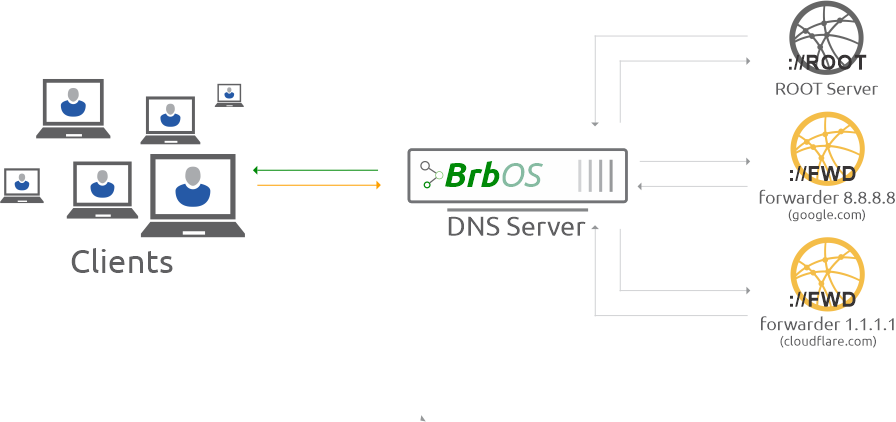DNS Recursive
Optimize Your Network with the BrbOS Recursive DNS Server!
Are you looking for a solution that increases your network performance, guarantees security and is easy to configure? We present the BrbOS Recursive DNS Server, an indispensable tool for ISPs, schools, hotels, companies and organizations looking for an efficient and reliable network.
Two widely used types of DNS (Domain Name System) servers are authoritative and recursive, which although they can be run on the same machine, have different characteristics:
- Authoritative - is responsible for maintaining maps referring to a local zone and responding to requests coming from machines around the world, which need to resolve domain names in the zone over which this server has authority;
- Recursive - is responsible for receiving DNS queries from local clients and consulting external servers, in order to obtain answers to the queries made.

The BrbOS Recursive DNS Server is the backbone of your network infrastructure, providing not only exceptional performance but also cutting-edge security for your customers. In addition to its fast and efficient responsiveness, BrbOS offers a range of advanced features, including access control (ACL), DNSSEC support, and flexible forwarding options. These features ensure a fast, secure, and reliable browsing experience for all users on your network.
By implementing BrbOS, you can mount a DNS server directly on your network, placing it closer to your customers. This not only reduces request response times, but also allows you to have more precise control over the security and performance of your network. With BrbOS, you are prepared to offer a high-quality and reliable browsing experience for your users.

Speed
Companies or companies that always have many users connected to their network, such as hotels, schools and internet providers, face significant challenges in ensuring a fast and seamless browsing experience for all users.
As the company or organization grows and the number of connected users increases, the number of DNS requests also increases significantly. This increase can result in network latency due to the large flow of DNS requests. However, when implementing a local DNS server, all these requests are aggregated, making the process faster and more efficient.
With the BrbOS Recursive DNS Server, these institutions can ensure ultra-fast response times, thanks to intelligent caching and the proximity of the server to the end user. Once a query is made, it is saved in the server cache using storage rules, ensuring that subsequent queries are answered within milliseconds, providing maximum efficiency for the network.
Security
A recurring problem in configuring recursive DNS servers is allowing queries from any machine on the Internet. These servers, known as open recursive DNS servers, represent a network security vulnerability, as only the authoritative server must respond to queries from external machines.
In BrbOS, it is possible to create ACLs and firewall rules to restrict access only to clients on permitted networks, ensuring that the recursive server can make queries to external DNS servers securely. For more details, see https://brbos.brbyte.com/resource/dns-acl-control.
In addition to exceptional performance, BrbOS offers advanced security features. It supports DNSSEC, an additional layer of security that protects against DNS spoofing attacks by ensuring the authenticity and integrity of DNS responses. Additionally, BrbOS's recursive DNS server allows for flexible forwarding configurations, ensuring a secure and reliable browsing experience for all users on the network.
With real-time graphics and full server management, it is easy to have a server in your company.
Download now and install on a server or virtual machine.
With real-time graphics and full server management, it's easy to have a server in your company.
Download and install right now on a server or virtual machine.
